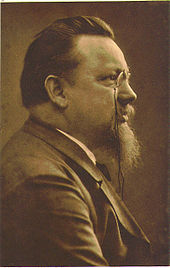Otto Ernst (writer)
Otto Ernst , actually Otto Ernst Schmidt , (born October 7, 1862 in Ottensen near Hamburg , † March 5, 1926 in Groß Flottbek near Hamburg) was a German poet and writer .
Life
Otto Ernst Schmidt (later he just called himself Otto Ernst) was born into a family of cigar-makers and grew up in poor conditions.
His teachers recognized that the boy was inquisitive and talented and encouraged him to do so. This enabled him to take up the teaching profession. In 1883, Ernst became a teacher at various elementary schools in Hamburg and also at a secondary school for girls. During this activity he met his future wife, his colleague Helmy Scharge, whom he married in 1887.
In 1891 Ernst founded the Hamburg “Literary Society”. In 1893 he published the literary-critical magazine The Viewer with Leo Berg and Constantin Brunner .
In addition to his teaching profession, Ernst worked as a freelance writer , playwright and lecturer. When the income from artistic activities was large enough, Ernst decided in 1901 to only care about art and turned his back on teaching.
In 1903 he bought a house in Groß-Flottbek, where he lived with his family - he and his wife had five children in total - until he died at the age of 63. The street where the family lived was later renamed Otto-Ernst-Straße in his honor . Otto-Ernst-Weg in Kiel-Pries has been named after him since 1940.
The furnishing of his study was brought to the nearby Christianeum high school as a donation by his youngest daughter Senta-Regina Möller-Ernst (1897–1998) , where it was rebuilt and restored in 2004. The restored room in the Christianeum has not been preserved since 2018, the components have been outsourced and a new use is not yet known.
Otto Ernst was buried in the Groß Flottbek cemetery.
Artistic creation
Otto Ernst was popular and well-known during his lifetime, but the critics valued him less. In an autobiography Ernst described himself as "hopelessly out of fashion ... because I do not remain silent and still about good and bad, but fight because, contrary to fashion and despite my own difficult, even disgusting experiences, I am an optimist, because after a healthy, strive for simple art ”.
Ernst's childhood story of his daughter Senta-Regina Möller-Ernst, known as Appelschnut , was published in 1905 and is still known today .
His autobiographical Asmus-Semper trilogy is considered a good observation of life in Ottensen before the turn of the century. The first volume Asmus Sempers Jugendland. A childhood novel was published in 1904, followed by Semper der Jüngling (1908) and Semper der Mann. An artist and fighter story (1916).
Flachsmann als Educator from 1900 is regarded as Ernst's most popular play, and Nis Randers as his best-known ballad . Nis Randers dramatically intensifies a basic human conflict in saving lives. The German Society for Rescue of Shipwrecked People (DGzRS) paid tribute to this poem by naming a rescue cruiser in Bremen in 1990 with the name Nis Randers .
Works (selection)
- Voices of midday - New poems , including Nis Randers
- Asmus Sempers Youth Land
- Semper the young man
- Appelschnut
- Seventy poems
- Hamborger Schipper stories
- Thunderstorm blessing; A war book
- Saint Yorick's carillon
- Humorous chats
- A happy play of colors
- From the quiet life
- Let in the sun!
- From the green-gold tree
- From my summer garden
- Stage works
- Flaxman as an educator
- Today's youth
- Ortrun and Ilsebill
literature
- Johannes Schumann: Otto Ernst. A literary study . Leipzig 1903
- Arnold Latwesen: Otto Ernst. A German lyric poet . Leipzig 1912
- August Volquardsen: Otto Ernst. A look into his life and work . Altona 1927
- Anke Weschenfelder: Ernst, Otto , in: Wilhelm Kosch (Greetings), Konrad Feilchenfeldt (Hrsg.): German Literature Lexicon 20th Century . Volume 8. De Gruyter, Berlin 2005, pp. 1905-1907. ( Preview on Google Books )
Web links
- Literature by and about Otto Ernst in the catalog of the German National Library
- Works by and about Otto Ernst in the German Digital Library
- Short biography and works on balladen.de (with picture)
- Works by Otto Ernst in Project Gutenberg ( currently usually not available for users from Germany )
- Works by Otto Ernst in the Gutenberg-DE project
- The poems on zgedichte.de
Individual evidence
- ↑ Otto-Ernst-Weg - On the history of a street in Kiel. Retrieved June 19, 2020 .
- ↑ Otto Ernst's study
- ↑ Matthias Schmoock: The farce about the poet's legacy in the Christianeum , abendblatt.de, February 27, 2018, accessed on June 15, 2018
- ↑ Gravestone image no. 207 at fotepress.de
| personal data | |
|---|---|
| SURNAME | Ernst, Otto |
| ALTERNATIVE NAMES | Otto Ernst Schmidt (full name) |
| BRIEF DESCRIPTION | German writer |
| DATE OF BIRTH | October 7, 1862 |
| PLACE OF BIRTH | Ottensen near Hamburg |
| DATE OF DEATH | March 5, 1926 |
| Place of death | Hamburg-Groß Flottbek |

